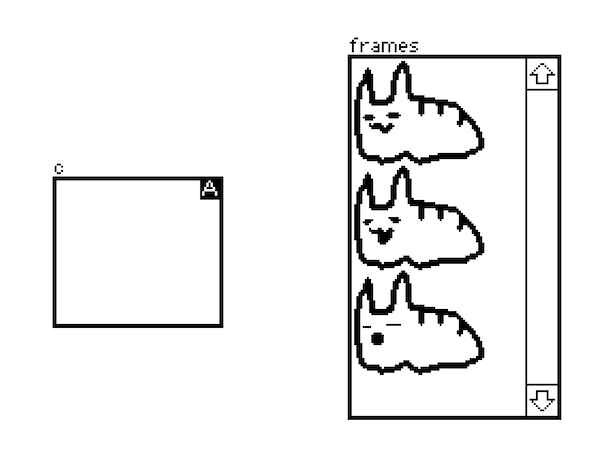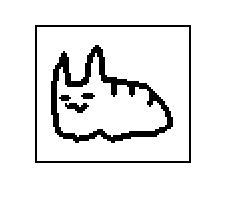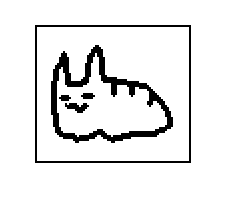Zazz is a module. You can't reference modules from inside contraptions, since they're both supposed to be reusable units that can be imported separately into other decks.
Fortunately, zazz.flipbook[] is pretty simple; we can make a loose equivalent by creating a rich text field, pasting our frames of animation into it, and then writing a script which pulls the images out of that field and picks one to display each frame. Say our canvas and frames field look like this:

If we marked the canvas as "animated" and gave it a script like the following:
on view do f:frames.images i:f[(count f) % sys.frame/4] c.clear[].paste[i .5*c.size-i.size] end
It would look something like this:

The first line grabs the images from the rich-text field as a list.
The second line uses sys.frame (which counts up at 60hz), divides it by 4 to produce a 15fps animation, takes that modulo the length of the list (%) and indexes into the list, so that the frames will repeat.
The third line clears the canvas and centers the image we selected within the canvas.
Many variations on this basic strategy are possible. We might, for example, introduce a layer of indirection with a separate frame index list to create more complex animations from a small number of frames:
on view do f:frames.images x:0,0,0,0,0,1,2,1 i:f[x[(count x) % sys.frame/5]] c.clear[].paste[i .5*c.size-i.size] end

Here's that whole example as a card you can paste into your deck and play with:
%%CRD0{"c":{"name":"frame_animation","widgets":{"frames":{"type":"field","size":[98,169],"pos":[302,98],"scrollbar":1,"value":{"text":["","i","i","i"],"font":["","","",""],"arg":["","%%IMG0AD0AMQAAAwAAAAAAAAAHgAAAAAAAAA/AAAAAAAIAD8AAAAAABwAdwAAAAAAHAD3AAAAAAA+AOOAAAAAAD4A44AAAAAAPgDjgAAAAAB+AcOAAAAAAP4Bw4AAAAAA7gHDgAAAAAHOAcOAAAAAAc4Bw4AAAAABxwHDgAAAAAHHAcHAAAAAAccDgf4AAAABxweB//AAAAOH/4D//8AAA4f/AA///AADg/wADg/+AAOAAAAOBz8AA4AAAA4HA4ADgAAADgcBwAOAA+AOBwHgA54H8AQCAfADvwPgAAAB+AOeAAAAAAH8A4AAAAAAA54DheMAAAADjgOH94AAAAEHA4P/AAAAAAeDgD4AAAAAA4OAHAAAAAABw8AAAAAAAAHBwAAAAAAAAcHAAAAAAAAA4cAAAAAAAADhwAAAAAAAAOHAAAAAAAAA4cAAAAAAAAHg4AAAAAAAD8DgAAcAAAA/APAAH4AH//4Af8B/wH//8AA/7/n3///gAA//8P/8AAAAAH+AP8AAAAAAMAAMAAAAA","%%IMG0AD0AMQAAAwAAAAAAAAAHgAAAAAAAAA/AAAAAAAIAD8AAAAAABwAdwAAAAAAHAD3AAAAAAA+AOOAAAAAAD4A44AAAAAAPgDjgAAAAAB+AcOAAAAAAP4Bw4AAAAAA7gHDgAAAAAHOAcOAAAAAAc4Bw4AAAAABxwHDgAAAAAHHAcHAAAAAAccDgf4AAAABxweB//AAAAOH/4D//8AAA4f/AA///AADg/wADg/+AAOAAAAOBz8AA4AAAA4HA4ADgAAADgcBwAOAA+AOBwHgA54B8AQCAfADvADgAAAB+AOYAAAAAAH8A4AAAAAAA54DhGMAAAADjgOH94AAAAEHA4P/AAAAAAeDgH8AAAAAA4OAfwAAAAABw8B+AAAAAAHBwHwAAAAAAcHAOAAAAAAA4cAAAAAAAADhwAAAAAAAAOHAAAAAAAAA4cAAAAAAAAHg4AAAAAAAD8DgAAcAAAA/APAAH4AH//4Af8B/wH//8AA/7/n3///gAA//8P/8AAAAAH+AP8AAAAAAMAAMAAAAA","%%IMG0AD0AMQAAAwAAAAAAAAAHgAAAAAAAAA/AAAAAAAIAD8AAAAAABwAdwAAAAAAHAD3AAAAAAA+AOOAAAAAAD4A44AAAAAAPgDjgAAAAAB+AcOAAAAAAP4Bw4AAAAAA7gHDgAAAAAHOAcOAAAAAAc4Bw4AAAAABxwHDgAAAAAHHAcHAAAAAAccDgf4AAAABxweB//AAAAOH/4D//8AAA4f/AA///AADg/wADg/+AAOAAAAOBz8AA4AAAA4HA4ADgAAADgcBwAOAAAAOBwHgA4AH8AQCAfADvAAAAAAB+AOAAAAAAAH8A4AAAAAAA54DgeAAAAADjgOD8AAAAAEHA4PwAAAAAAeDg/AAAAAAA4OD8AAAAAABw8HgAAAAAAHBwAAAAAAAAcHAAAAAAAAA4cAAAAAAAADhwAAAAAAAAOHAAAAAAAAA4cAAAAAAAAHg4AAAAAAAD8DgAAcAAAA/APAAH4AH//4Af8B/wH//8AA/7/n3///gAA//8P/8AAAAAH+AP8AAAAAAMAAMAAAAA"]}},"c":{"type":"canvas","size":[78,69],"pos":[164,155],"animated":1,"script":"on view do\n f:frames.images\n x:0,0,0,0,0,1,2,1\n i:f[x[(count x) % sys.frame/5]]\n c.clear[].paste[i .5*c.size-i.size]\nend","scale":1}}},"d":{}}
Within a fancy puppet we can't rely on "animated" sub-widgets to pump animation events, so instead we'd put similar code inside a function called by the function returned by get_animate[], like in the example from the puppeteer docs:
on view do f:frames.images x:0,0,0,0,0,1,2,1 i:f[x[(count x) % sys.frame/5]] c.clear[].paste[i .5*c.size-i.size] end on get_animate do on animate do view[] end end
Does that make sense?

